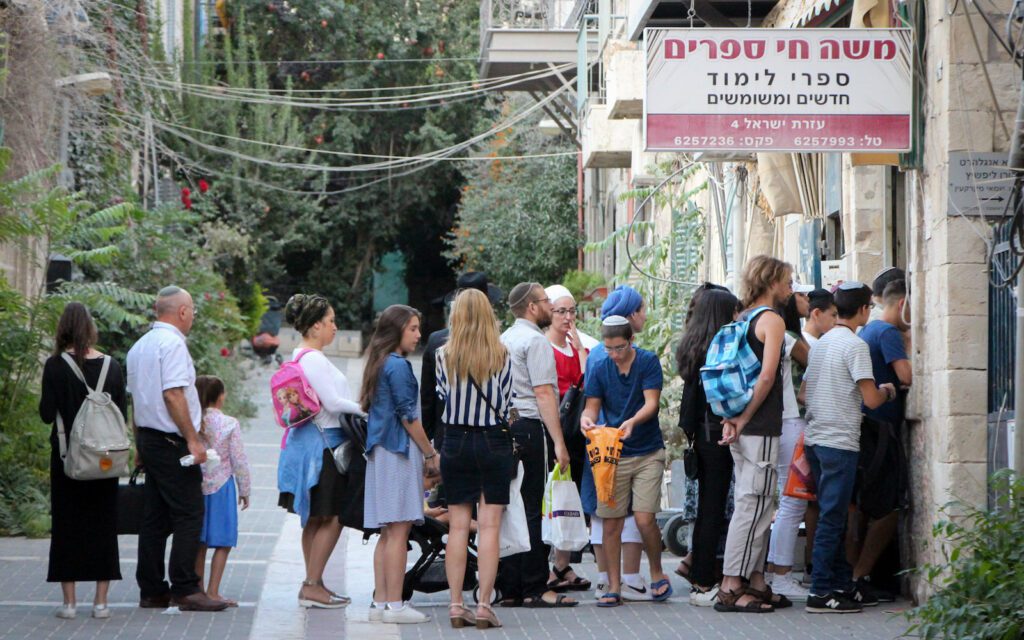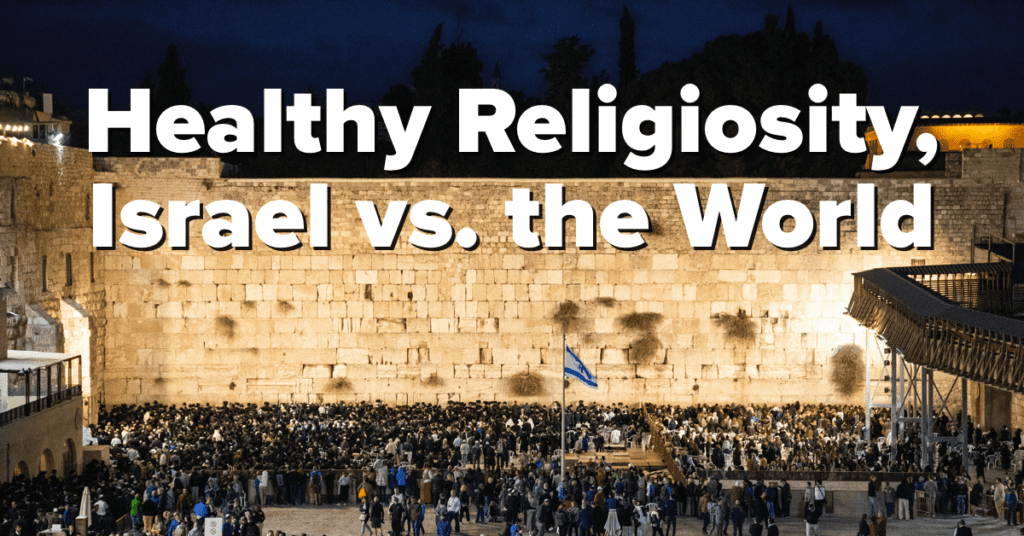Table of Contents
I’ve noticed a bit of a trend lately. Folk who come to live in Israel, and slowly but surely their religiosity starts to dip.
The Religiosity Counterintuitive
On the surface, this is quite counterintuitive. There are so many reasons why one would think this could never happen. First and foremost, we’re in the Holy Land. On every corner there’s a synagogue. Everywhere you look there are religious people, objects, and opportunities. And the land itself is covered from top to bottom with history and significance. So how could it be that in an environment such as this, one could possibly lessen their enthusiasm, observance, or religiosity?
I’d like to suggest five possible reasons:
1) The Israel Challenge

Israel is generally a challenging place to live.
If you are elsewhere, and you live in a beautiful, large home, your high-power job pays a fantastic salary, and you are surrounded by endless activities, life in general can be much easier.
But who has time to think about going to classes and services when they’re not sure how they could possibly cover their rent or where their next meal is coming from?
On a philosophical level, it’s easy to say that one’s connection to God and religiosity should never parallel how great one’s life is. But in reality, that’s how it is for most of us. It is far easier to stay strong and focused when we’re happy, fulfilled, stress-free, and well fed. Throw some powerful life challenges into the mix, and it seems reasonable that some observance might shrink away simultaneously.
2) The Adversity Discrepancy

On the flip side, there are certain challenges to living outside of Israel that can possibly strengthen one’s connection and religiosity.
When you are surrounded by people just like you, the tendency is to become complacent. It’s easy. Being one of the Chosen People is a given, and takes no work whatsoever.
But when you find yourself surrounded by hatred, the tendency is often to pull yourself together and learn to love your circumstances even more. I have watched as barely connected Jews stared bravely into the eyes of evil antisemites. They didn’t consider their own wellbeing; they were pushed to stand up for what’s good and right in this world.
Being just a face in the crowd of a bunch of people exactly like yourself, might encourage complacency. Needing to defend your people, may encourage loyalty and pride.
Being just a face in the crowd of a bunch of people exactly like yourself, might encourage complacency. Needing to defend your people, may encourage loyalty and pride. Share on X3) Challenge Breeds Awareness

It’s a bit odd. I sometimes miss certain inconveniences of living outside of Israel.
There are two obvious examples of where this comes into play all the time: Kashrut (Jewish dietary laws) and Shabbat observance.
In Israel, and especially Jerusalem, you can meticulously observe both practices while barely breaking a sweat. The society is designed to make them simplistic. Entire grocery stores are filled exclusively with kosher items, and many areas are lined with kosher restaurants. The city shuts down for the Sabbath, and the best way to spend the day is feasting with family and friends.
But not so outside of Israel. You need to work harder to make sure you’re always purchasing the appropriate items. You must look at literally everything you take off the shelf. If there’s no kosher bakery around, or you’re dissatisfied with the selection, you’ll need to learn to make those beautiful Shabbat challahs on your own. Yeah, all of this is a pain… but it promotes awareness and a stronger connection to what you are actually doing.
Another great example is something called an eiruv. According to strict Jewish law, we may not carry anything outside during the Sabbath. In order to get around the rules, we create something called an eiruv (a virtually invisible, and extraordinarily complicated, legal structure). And voila, we carry items like there never was a rule in the first place. In Israel, it’s easy to forget this is even happening, since there seems to be an eiruv everywhere, and someone somewhere is in charge of caring for it. In many places outside of Israel, this is something that may require greater focus.
Sure, these issues can be a pain or an inconvenience. But when we work for something, we tend to have a greater appreciation for it. And further religiosity may ensue.
4) The Opportunity to Shine

Take someone out of their pond and place them elsewhere, and that’s when the opportunity to shine comes up all the time. Here in Israel, I almost never have the chance to explain Judaism to a perfect stranger, something I felt was practically a daily occurrence when I lived elsewhere. And nothing makes your love of your own people grow more than when you know your conversation partner is listening attentively to every word, and yours might be the only explanation they ever hear.
We have a very special responsibility to the world. Every day we must represent our people to the best of our ability. And that responsibility, as daunting as it may be, has a huge impact on how we carry ourselves and conduct our daily lives. Remove us from the world at large, and even though that responsibility is alive and well, it’s quite easy for many to think it’s irrelevant. And without the many watching eyes upon us, it’s simple to cease being our best selves.
5) We Are Unique

It’s very easy to feel faceless in Israel. I am just another one of the thousands and thousands just like me. My contributions are minimal and my knowledge is hardly unique. I’m surrounded by others who know everything I know, and many of them know much, much more.
But place me somewhere else, and now I’m something special and exotic. In Jerusalem, no one ever asks me why I don’t eat milk with meat. Elsewhere, I’m something different. And those differences matter.
We don’t always want to be special. It’s so much easier and more convenient to just do what everyone else around us is doing. Sometimes it’s simpler to just be faceless and to disappear into the crowd. But for many it feels quite nice to be something special. And it affects how we act and feel every day of our lives.
What do you think is the reason for this paradoxical religious shift?




I would suggest another possibility – outside of israel many people who may not truly feel at peace with orthodox jewish living will still practice because that is the only way for them to be connected – simply feeling culturally jewish is not enough because there is too much pressure from other cultural outlets to pick them instead. In Israel where most of the country feels culturally jewish but half of them are not actually practicing it is easier to still feel that connection to judaism and not have to keep to the same level of practice that you did before.